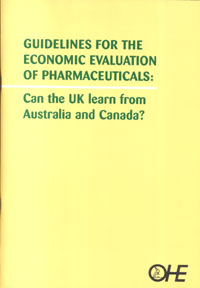Sign up to our newsletter Subscribe
Challenges and Solutions for Budget Impact Analysis of Gene Therapies

Getting value for money from the use of pharmaceuticals is crucial for the NHS. This publication explores the role for guidelines in generating good quality value for money information examining the experience of Australia, Canada and the UK – the first three health…
Getting value for money from the use of pharmaceuticals is crucial for the NHS. This publication explores the role for guidelines in generating good quality value for money information examining the experience of Australia, Canada and the UK – the first three health care systems to introduce national guidelines for economic assessments.
Some commentators have argued that the UK is lagging behind Australia and Canada by linking guidelines to a voluntary approach to the supply of economic information, rather than introducing rigorous guidelines and (in Australia and Ontario) a formal requirement for studies to assess the cost effectiveness of new medicines. A number of issues arise for the UK. Some relate to whether differences between health care systems require different approaches, notably whether:
• the lack of NHS policies on rationing mean that it is better to concentrate on other means of getting value for money from pharmaceuticals;
• the decentralised nature of NHS decision making requires a less prescriptive approach to guideline content and study requirements;
• given this decentralised approach, enough high quality economic information on pharmaceuticals is being supplied and used in the NHS?
Others relate to the content and process of developing guidelines. In particular whether:
• more detailed guidelines are needed to enable comparisons between study results to be made;
• the process by which guidelines are drawn up is important to their effectiveness.
The publication examines the workings and impact of the Australian and Canadian Guidelines. The key elements of the UK prescribing environment are then examined, including existing value for money arrangements, the role of the UK Guidance, the way in which the UK promotional code of practice polices economic information, the methodological issues involved in complying with the UK Guidance, and the role of the UK NHS CRD in reviewing economic evaluations. An overview concludes that, in relation to system design:
• economic evaluations are having much more impact on prescribing expenditure in Australia and Canada;
• the NHS, however, has much better arrangements for getting value for money from medicines;
• lack of explicit rationing criteria limit the use of economic evaluations in all three countries, but much more so in the NHS;
• barriers to moving funds between health care budgets, rather than lack of information, are seen by NHS decision makers as the major obstacle to greater NHS use of economic evidence;
• the credibility of studies remains an issue although the NHS has put in place arrangements, including the NHS CRD database and the ABPI/Government guidance, to raise quality.
In relation to the content of guidelines and the process of development;
• guidelines can only be more prescriptive if decision makers are clear about the information they want, and the perspective they intend to take;
• methodological issues remain unresolved which will mean continued debate on choice of design, outcome measures and sources of evidence.
Perhaps the most important message is that there should be more use of information from economic studies in the UK, but the experiences of Australia and Canada do not suggest that there is an easy route to achieve this. We do not know how cost-effective the approaches of the three countries are. We do know that changing the culture of a health care system takes time. Guidelines can play an important part in stimulating change.
In the UK there is some way to go. The NHS and the pharmaceutical industry need to review progress. To the extent, however, that public and medical attitudes to rationing are reflected in the government’s policy that patients continue to receive all medicines they clinically require, the role for economic evaluation may be limited. Value for money may be more effectively sought through other routes. Continued financial constraints, however, together with the growing role for GPs in purchasing, may lead to greater use of clinical and prescribing guidelines and of research into local outcomes. Economic evaluation may be more readily accepted when contributing to these activities.
Guidelines for the Economic Evaluation of Pharmaceuticals: Can the UK learn from Australia and Canada?
Towse, A. ed.
(1997) Guidelines for the Economic Evaluation of Pharmaceuticals: Can the UK learn from Australia and Canada?. OHE Monograph. Available from https://www.ohe.org/publications/guidelines-economic-evaluation-pharmaceuticals-can-uk-learn-australia-and-canada/